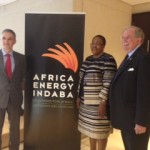
- by Monique Tsang and Celine De Canha
At the event the South African Minister of Energy, Ms Dipuo Peters, gave her commitment to support women and promote skills in the energy sector.
In a keynote speech, Ms Peters (pictured, centre) announced the introduction of a new programme, Empowering Women in Clean Energy (EWCE), as a joint venture by the South African Department of Energy; the Africa Energy Indaba; and Cennergi, the South African renewable energy provider. Ms Peters said the initiative would focus on supporting women in industry, education and training, and communities and enterprise.
The scheme was announced as part of South Africa’s Clean Energy Education and Empowerment Initiative for Women (C3E), launched in 2011.
At the Indaba Ms Peters also highlighted the need to boost Africa’s skills base. She said: “Our continent suffers from a chronic shortage of appropriately educated and skilled people, particularly in the energy sector and in areas of engineering and science. We cannot successfully implement mega and other [energy] projects in the absence of a trained, stable and skilled labour pool.”
As a case in point, Ms Peters said the construction delays of the Medupi Power Plant in South Africa were “mainly due to not having the requisite skills and having to import labour in a sea of unemployment and poverty.” She added that interruptions at this and other construction sites “have serious implications on our energy supply security”.
During the Indaba Ms Peters also accepted her speaking role at the World Energy Congress, the WEC’s triennial global energy gathering.
The Indaba, which in the Zulu language means ‘conference’ or ‘gathering’, was presented by SANEA and supported by the African Union and the NEPAD Planning and Coordinating Agency.
All panel discussions at the Indaba have been moderated by well known leaders in the energy sector, and this year all moderators of the 11 panels were women.
“I believe this was a global first for an energy conference,” said Brian Statham (pictured, right), Chair of SANEA, in an e-newsletter to SANEA members after the event. Further, he believed that the near lack of “any mention [of this] by either delegates or the media” could be a sign that “at professional levels South Africans have become so used to women playing leading roles that it is no longer a surprise.”
“What is now needed is to spread the good news and use these role models to encourage young people to enter this exciting field,” he added.
Ms Liz Hart, Managing Director of Siyenza and organiser of the Indaba, said: “We are delighted to support the growth and development of women in the energy sector.”
The Indaba also hosted several workshops on the WEC’s work streams, on the World Energy Scenarios, the World Energy Trilemma, and Energy Access and Village Inventory projects.
In a media roundtable on the energy challenges for Africa, WEC Secretary General Dr Christoph Frei (pictured, left) outlined the top issues on Africa’s energy agenda based on the findings of the 2013 World Energy Issues Monitor. The other roundtable panellists were Professor Abubakar Sambo, the WEC Vice-Chair for Africa; Mr Brian Statham, Chair of the South African Energy Association (SANEA); and Professor Elmissiry, Head of Energy Programmes of NEPAD.
Catch up on select media coverage of the World Energy Council at the Indaba:
-
SABC News – “Expert highlights Africa's energy needs”
-
Business Day – SA “needs coherent energy policy”





